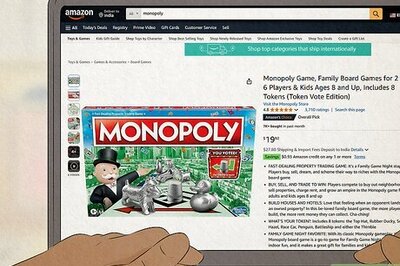
views
BRUSSELS: European Commission chief Ursula von der Leyen began trying to piece together a coalition on Monday after the far right surged in a European Parliament election, spurring French President Emmanuel Macron to call a snap national vote.
A rightward shift inside the European Parliament may make it tougher to pass new legislation to respond to security challenges, the impact of climate change or industrial competition from China and the United States.
Von der Leyen, the German president of the European Union’s powerful executive body, emerged strengthened from the four-day election across 27 countries that concluded on Sunday, as her centre-right European People’s Party (EPP) gained seats.
But to secure a second five-year term, von der Leyen needs the support of a majority of the EU’s national leaders and a working majority in the European Parliament.
Provisional results on Monday gave the main parties that backed von der Leyen last time – the EPP, socialists and liberals – a total of 402 seats in the 720-member chamber.
But that is widely regarded in Brussels as too tight a majority for comfort. So von der Leyen may also reach out to the Greens, who suffered heavy losses, and Italy’s nationalist Prime Minister Giorgia Meloni, with whom she has worked closely.
Late on Sunday night, von der Leyen said she would start by trying to rebuild the parliamentary bedrock of her last term.
“I have been working on building a broad majority of pro-European forces. And this is why, as of tomorrow, we will be reaching out to the big political families that we have formed the platform with,” she told reporters in Brussels.
Von der Leyen indicated she would talk to others after those initial consultations, keeping her options open.
KEEPING OPTIONS OPEN
She said she aims to work with those who are “pro-European, pro-Ukraine and pro-rule of law” – a description that she has made clear she thinks applies to Meloni’s Brothers of Italy but not to some other far-right parties.
However, the socialists, liberals and Greens have all declared they will not work with the far right, making von der Leyen’s coalition-building efforts extremely delicate.
Meloni also kept her options open on Monday, saying it was too early to decide on a second term for von der Leyen.
Nationalist, populist and EU-sceptical parties are on course to win about a quarter of seats in the EU assembly.
Political analysts attribute the overall shift to the right to rising costs of living, concerns about migration and the cost of the green transition as well as the war in Ukraine – worries that nationalist and populist parties have seized upon.
However, exactly how much clout these parties will wield will depend on their ability to overcome differences. They are currently split between two political families, and some parties and lawmakers for now stand outside these groupings.
The provisional results showed the EPP winning 185 seats, with socialists on 137 and liberals on 80.
MACRON, SCHOLZ BRUISED
The repercussions of the vote were felt far beyond Brussels.
In France, the far-right National Rally of Marine Le Pen won more than 31% of the vote, trouncing Macron’s centrist Renaissance party – which scored just 14.6% – and prompting him to call a snap national parliamentary election.
In Germany, the far-right Alternative for Germany took second place with 15.9% of the vote – ahead of Chancellor Olaf Scholz’s Social Democrats, who garnered 13.9% in their worst-ever result.
Meloni, by contrast, was boosted as her party came first in Italy with more than 28% of the vote.
In Poland, Prime Minister Donald Tusk’s centrist Civic Coalition, a member of the EPP, came first. In Spain as well, the centre-right People’s Party, also part of the EPP, came out on top, outperforming Socialist Prime Minister Pedro Sanchez.
The European Parliament co-decides with the EU’s national governments on laws proposed by the European Commission to govern the bloc of 450 million people.
Disclaimer: This post has been auto-published from an agency feed without any modifications to the text and has not been reviewed by an editor

















Comments
0 comment